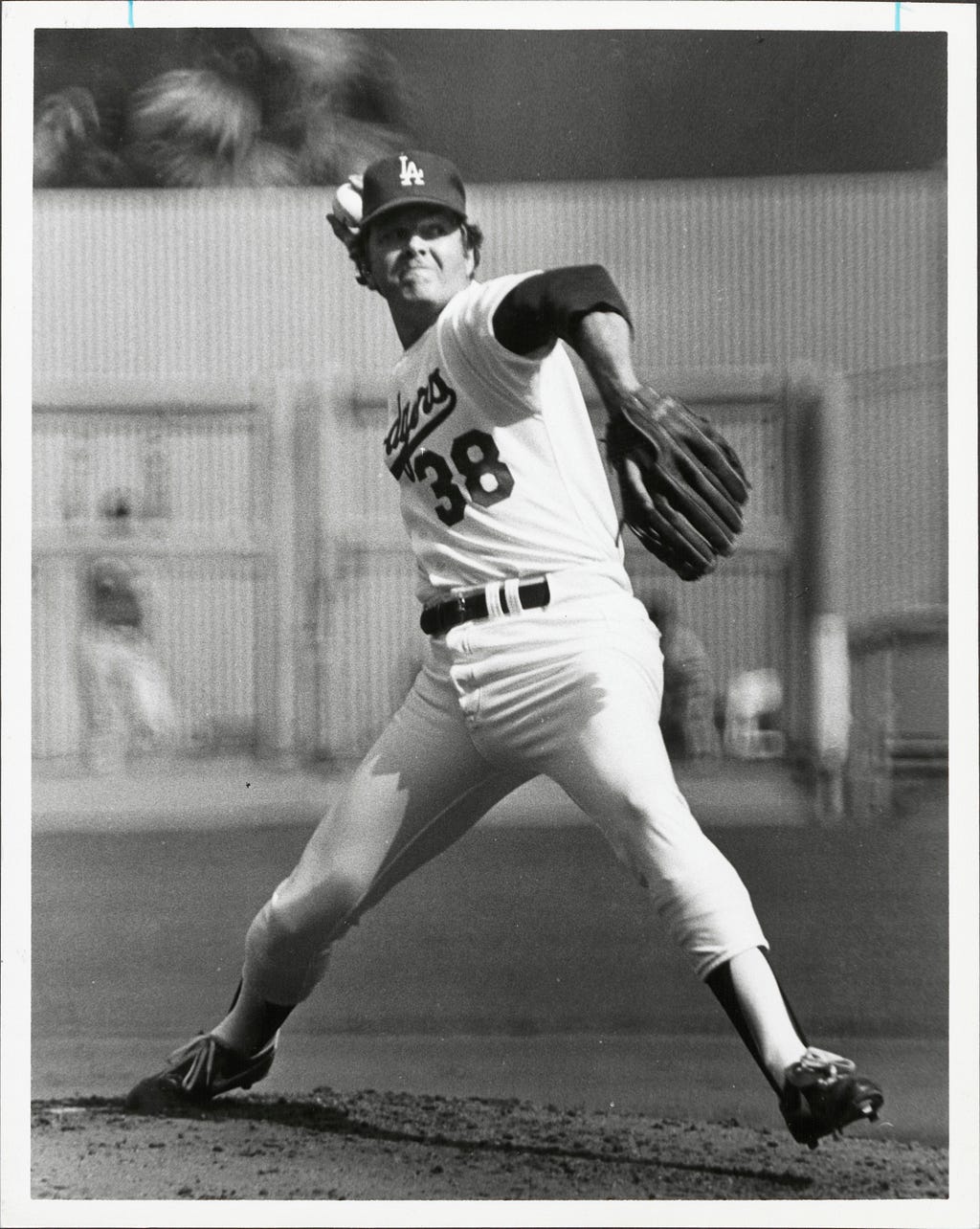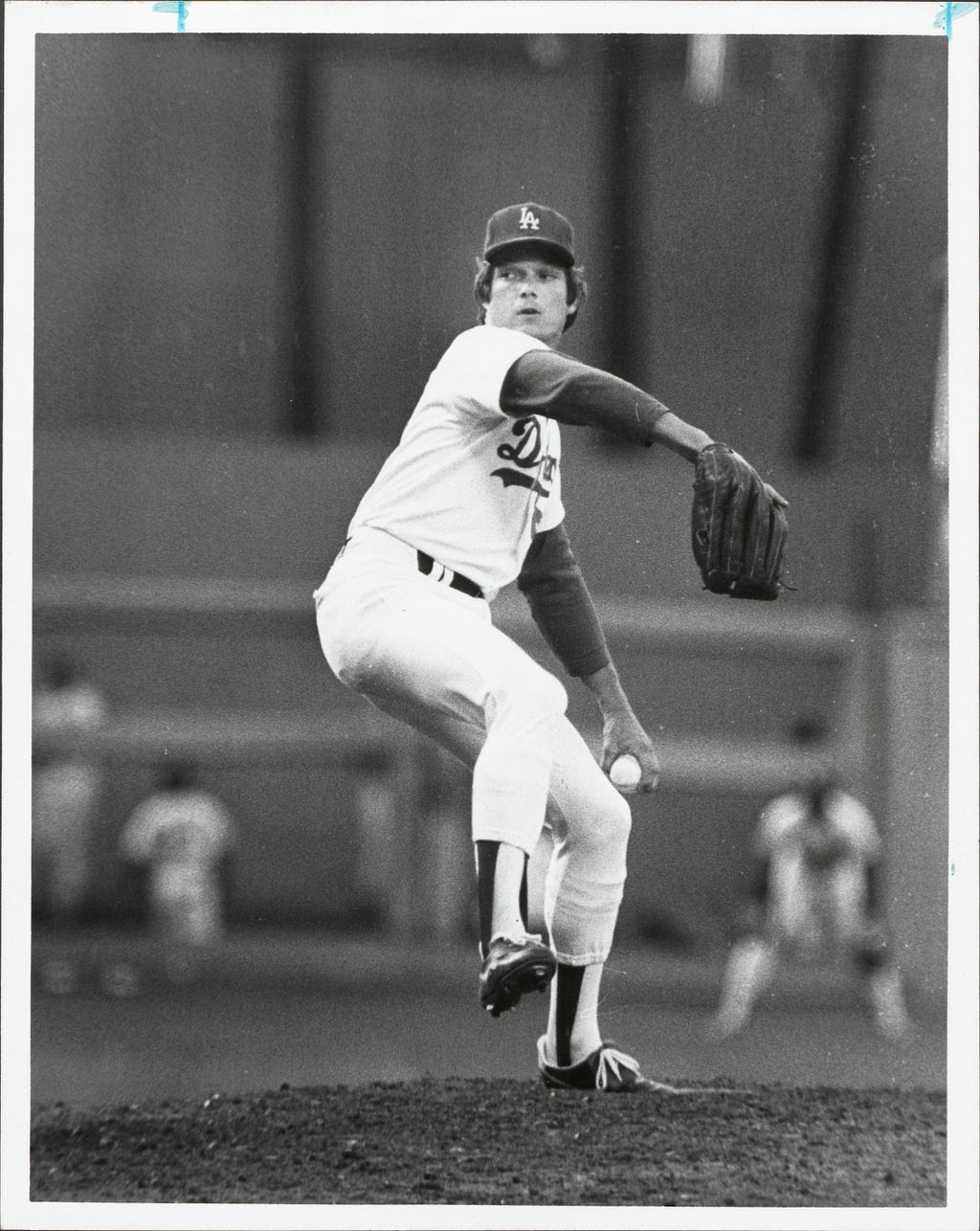
by Mark Langill
Whether recalling his days as a Brooklyn Dodger batboy in Spring Training 1956 or as a perennial All-Star first baseman of the 1970s, Steve Garvey can usually recite the details of his career with encyclopedic ease.
But ask Garvey about Game 4 of the 1981 World Series against the Yankees and he has a few questions of his own.
“Was that played in New York?”
“What was the score?”
“I think it was a day game.”
Garvey’s memory bank is batting .333 on this subject.
Unlike the storybook ending to the Dodgers and Yankees on Friday night at Dodger Stadium — Freddie Freeman hitting the first walk-off grand slam in World Series history — the Dodgers’ 8–7 victory over New York on Oct. 24,1981 was a Fall Classic mess.
One day after manager Tommy Lasorda allowed Fernando Valenzuela to make 149 pitches in a 5–4 complete-game victory in Game 3, he yanked his starter, Bob Welch, after just four batters.
After losing the first two games of the World Series in New York, Valenzuela’s victory gave the Dodgers a chance. Lasorda didn’t want to risk falling behind 3–1 in the series with potential Games 6 and 7 at Yankee Stadium.
Although it wasn’t pretty, Game 4 allowed the Dodgers to hold serve and tie the series at two games apiece.
“It was a bullpen game,” says Tom Niedenfuer, the former Dodger right-hander who was one the third of four relievers to follow Welch. “Tommy knew he could use the bullpen because Fernando pitched the whole game the previous night. That didn’t mean we were all rested. It felt like I threw 100 pitches in the bullpen because I kept warming up while Fernando was in constant trouble.”
Welch, 9–5 with a 3.44 ERA in 23 starts during the regular season, wasn’t in the game long enough to get tired. Leadoff hitter Wille Randolph tripled to right and scored on Larry Milbourne’s double. Welch then loaded the bases by walking Dave Winfield and allowing Reggie Jackson’s single to left. Welch became only the fourth World Series starter to fail to retire a batter.
“It was very embarrassing,” Welch told The Sporting News after the game.
Lasorda’s first choice out of the bullpen was veteran right-hander Dave Goltz, a former high-profile starting pitcher with the Minnesota Twins and now trying to contribute as a long reliever in the bullpen.
The Dodgers signed Goltz as a free agent prior to the 1980 season, one of the team’s first high-profile acquisitions, along with Baltimore Orioles reliever Don Stanhouse. Goltz had modest success in 1980 — a 7–11 record and 4.31 ERA, but he was best known for losing the National League West tiebreaker against the Houston Astros, 7–1.
When Valenzuela joined the starting rotation in 1981, Goltz was bumped into the bullpen. Eighteen of Goltz’s 26 appearances in 1981 were in relief. Seven of his eight starts occurred in the second half of the strike-shortened regular season when the Dodgers were already headed for the postseason as first-half NL West champions.
Goltz was a spectator for the Dodgers in the first two rounds of the playoffs against the Astros and Montreal Expos. His first career playoff appearance would be a bases-loaded jam in the World Series.
“It definitely was a surprise,” Goltz said last week from his home in Fergus Falls, Minnesota. “I thought Welch would go at least four five innings. That didn’t happen. When I was with the Twins, I was used to knowing three or four days ahead of time when I was going to start. Pitching in relief was new to me and suddenly I’m in the World Series, battling nerves, in the first inning.”
Goltz retired Oscar Gamble on a flyout to shallow center. Bob Watson’s sacrifice fly to left field scored Milbourne. Goltz kept the score 2–0 by retiring Rick Cerone on a force out.
Goltz gave the Dodgers three innings. He allowed two runs on four hits, including a home run by Randolph in the second inning. The Yankees scored a run in the third inning to make it 3–0, but Goltz escaped a bases-loaded jam by inducing a ground out off the bat of Yankees starting pitcher Rick Reuschel.
Trailing 4–0, the Dodgers scored two in the third inning off Reuschel, who allowed six hits in three innings.

In the sixth inning, a throwing error by shortstop Bill Russell led to two unearned runs, giving New York a 6–3 lead.
Like Goltz, another veteran was about to contribute. Reserve outfielder Jay Johnstone, who batted .205 in 61 games during the regular season, predicted during batting practice that he was going to hit home run off Yankees right-hander Ron Davis, who was the Yankees’ setup man for closer Goose Gossage. To make his point, Johnstone pulled a batting-practice fastball into the Right Field Pavilion.
Johnstone, who hit three home runs as a pinch-hitter in 1981, called his shot. His two-run home run off Davis in the sixth pulled the Dodgers to within 6–5.
“I did the same thing in the game, same home run, same pitcher,” Johnstone said in a 2011 interview on the 30th anniversary of the 1981 championship. “I was just trying to fire up my teammates. Wouldn’t you know it really happened.”
After Johnstone’s home run, Davey Lopes lofted a fly to Jackson in right field. Jackson lost the ball in the sun. The ball hit Jackson’s chest for a two-base error.
“There was a high sky, and it was slicing,” Lopes told The Sporting News. “I just had the feeling it was going to drop so I busted tail to second base. I said, ‘He’s going to drop it.’ I don’t know if somebody was listening or what.”
Lopes stole third on Davis and scored the tying run on Russell’s single to make it 6–6.
The Dodgers got another break on shaky New York defense in the seventh inning. After Dusty Baker ended a 0-for-11 series slump with an infield single, Rick Monday hit a sinking line drive that was misjudged by reserve outfielder Bobby Brown. Instead of an out, Monday had a double to put runners on second and third.
Yankees manager Bob Lemon called for an intentional walk to load the bases. Since it was too early for Lemon to call on his closer, he used former Dodger Tommy John, the Game 2 starter who went the first seven innings of a 3–0 victory.
In an era when closers routinely pitched multiple innings, Lemon also didn’t want to risk Gossage in a potential extra-inning game.
“You bring him in and then you’ve got to go with Gossage in the seventh, eighth and ninth,” Lopes said. “Then you might get into the 10th and 11th and then he’s done. I think you know when Gossage goes three innings, he’s not nearly as effective the next day as well.”
Steve Yeager’s sacrifice fly scored Baker with the go-ahead run. After a sacrifice bunt by relief pitcher Steve Howe, Lopes hit an RBI single to make it 8–6.
Jackson’s home run in the eighth off Howe got the Yankees close. The Yankees rallied in the ninth inning. Rick Cerone hit a one-out single to center. Pinch-hitter Barry Foote struck out. Pinch-hitter Bobby Murcer reached first on Howe’s fielding error to put runners on first and second.
Howe, who pitched the final three innings, retired Randolph on a flyout to center to end the game.
Goltz, 75, looks back fondly on the Dodgers’ championship season. In addition to his unexpected Game 4 appearance, he escaped a bases-loaded jam in the fourth inning of Game 1 at Yankee Stadium. After Bobby Castillo forced home a run on a walk to give the Yankees a 5–0 lead, Goltz faced Lou Piniella, who popped up to second base.
The Dodgers lost the opener, 5–3, but Goltz kept the game within reach.
“So many times over the years, I’ve throught about the pitch sequence to Piniella,” Goltz says. “And it doesn’t bother me because every time I replay that at-bat, he pops out.”
World Series: Game 4 of the ’81 Series was forced into being a bullpen game was originally published in Dodger Insider on Medium, where people are continuing the conversation by highlighting and responding to this story.